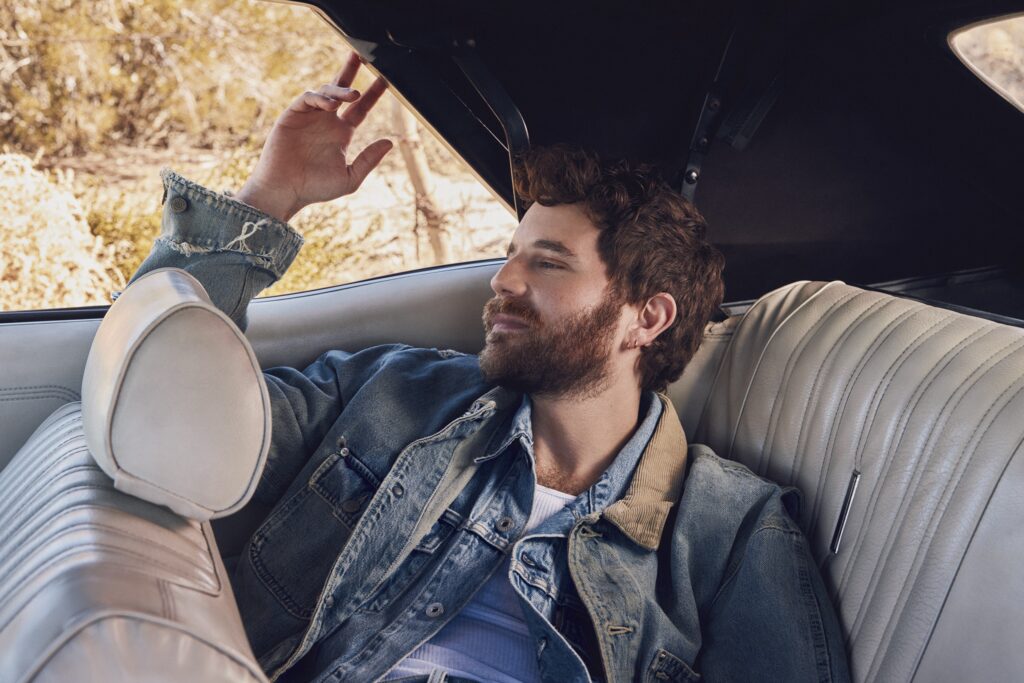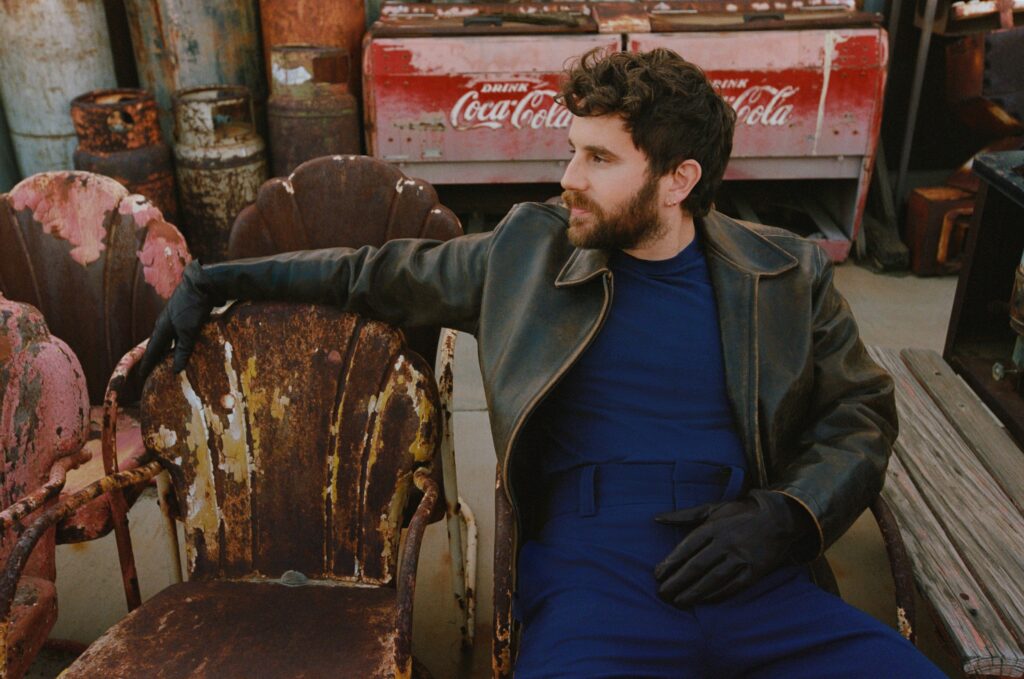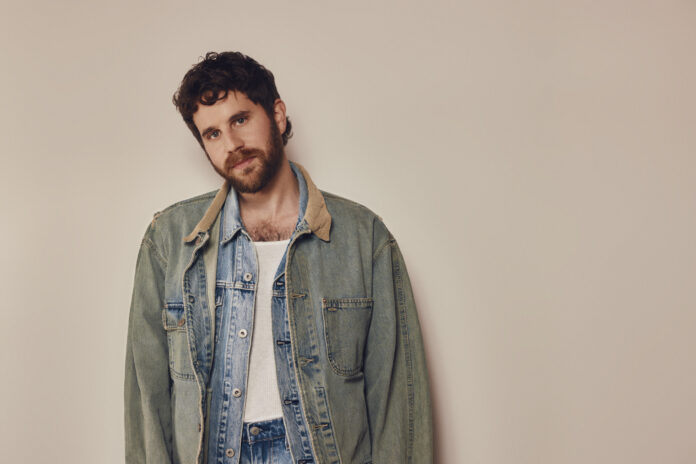The facial hair comes up because it has to. After all, the unofficial rulebook for any Americana artist stipulates somewhere that wherever an acoustic guitar shall go, a full beard must too. And so Ben Platt is all about his furry face, but not just because he’s in full-on folk-roots mode for his third solo album, “Honeymind.”
Considering this particular genre isn’t necessarily a welcoming platform for openly queer musicians (or even close to one), there is a quiet rebelliousness to Platt simply existing in that space — just ask Beyoncé, who shook up the country community just for being a Black artist releasing her rural-toned “Cowboy Carter,” a nod to her Southern roots. As for Platt, his subtle defiance is front and center on the album’s cover, as he queers a classic vintage car-makeout scene while straddling the lap of his fiancé, Noah Galvin, but it is also embedded in its songs of longing, love and more love, too.
During a recent April afternoon from his place in New York, I spoke with Platt about the reasons he’s especially proud to be an openly queer artist on “Honeymind,” how buying his first home with Galvin inspired one very special song on the album and how he really feels about being a hairy Jew.
When I saw you in Detroit in 2019, what I noticed was just how loving and loyal your fans are. They really love you. I wondered about that long history, which I’d say definitely dates back to your role on Broadway in “Dear Evan Hansen.” How do you explain the bond you’ve established with your fans?
It’s hard. It’s sort of ineffable because the introduction was “Dear Evan Hansen,” and that was something where I was really emotionally burying myself as much as I possibly could, and I think I was able to really forge a meaningful connection without ever necessarily expressing my own perspective. When I started to do that, it was in the same vein of really not trying to create any kind of wall or filter or version of myself, but rather just continuing to share even more openly, as much as I could, my own experiences and my point of view.
I always try to give as much of myself as I have available to me whenever I’m performing or doing anything for an audience or for fans. I think that mine really recognize that and respect that, and I hope to keep doing good by them. I think it’s that level of transparency and earnestness. There are a lot of great, wonderful artists giving things with a lot more edge, and apathy, and other things that are not natural to me. I can only give what I can give. I’m lucky there’s people who really seem to connect to that.
On the flip side, who do you feel this level of love for?
Anyone that is really vocally impressive, I fall in love with, but Beyoncé remains my number one in the sense that she is sort of guarded, and I think that’s been a whole part of her thing — how perfect and pristine she is. Within that, you can see so much unbelievable hard work, talent, vision and experience that she’s trying to share and communicate. I just think she’s the greatest live performer ever. If we’re judging by who leaves it all on the floor and gives you everything they have in their body, Beyoncé’s number one.
With “Cowboy Carter,” Beyoncé also happens to be finding her place in Americana right now. Did you two orchestrate this?
Yeah, we decided on our conference call that we should both stick to the same stylistic world. [Laughs.]
What inspired your shift to folk music?
It was the kind of thing where that’s just really very organically what started to come out. I went to Nashville for the first round of writing for this record, all the way back in April 2022. I’ve been working on this record for a long time, and I knew I wanted to go to Nashville because there’s so many writers there that I love, both ones that I have worked with before, like Alex Hope, who’s a writer on almost half of the songs on the album. Then a lot that I admired that I wanted to work with, like Natalie Hemby, Hillary Lindsey, Jim Robbins and Laura Veltz. I went with the intention of just working with these people who I knew were very storytelling-forward and emotionally narrative-driven and honest and melodic, and all the things that I wanted, but didn’t necessarily have a particular style in my mind of what we needed to accomplish.
When I started to write about where I was at and the experiences I was having, that’s just the sound that emerged. As it started to come out, I got really excited because it felt very natural to my style of storytelling and singing. It just felt like an organic landing pad for where I’ve sort of been wanting to return to. Then also just the idea of the super expressly queer perspective living in that sonic world is not something I necessarily have heard or seen a lot. Most of the artists that I love in that zone write beautiful songs that are very universal, but aren’t necessarily like the Troye Sivans and Lil Nas Xs, and the people who are giving us really specifically queer content, which I love. The idea of doing something like that, but in this much more subdued kind of introspective, emotionally earnest style, was really exciting to me.

I know that you’ll get this reference because you’ve covered Brandi Carlile’s “The Joke,” but the boy you’re singing about in “All American Queen” sounds like he should be friends with the boy in Brandi’s song “The Joke.”
Absolutely. I feel like hopefully the boy in “The Joke” grows up to become the boy in “All American Queen.” Because there are so many origin songs, I just wanted it to be like “Sweet Child O’ Mine,” and all these songs about just happy upbringings, American images, values and traditionally American terms, and the idea of writing about a queer upbringing in America where it’s purely about the joy of it and the fun of it, and there’s no talk about tolerance, difference, otherness, oppression or trauma, any of that. It’s just this super dirt road, fun, gay narrative, which was really fun and exciting to me. That’s another one I wrote with Alex.
Then, of course, for any queer person, your song “Andrew,” the first single, is entirely relatable. Who among us hasn’t had an unrequited crush on a straight boy? How did that song come about, and how did you navigate your first Andrew?
The song came about because I was talking to a friend of mine who was one of the writers on the album, a different writer than Alex, who I wrote “Andrew” with, but she was telling me about her child and how he has a best friend who he loves so much, and how she was getting the sense that there was a little bit of an unrequited infatuation happening and that he felt so much for this friend that she just didn’t feel was the same for him.
It just seemed like so many friendships and experiences that I had growing up in elementary school, middle school and high school. The next day during a session, I said, “I really want to write about this ineffable straight boy who is kind and doesn’t do anything wrong, and there’s no one at fault. It’s just a chemical misfire, essentially.” I love the song that we wrote, and for me, probably my first few Andrews were things I couldn’t even really name, like friends who I had that I had feelings for or love for but I didn’t know what it was.
One of my best friends in high school, who did improv and musicals with me, I just really connected with on every level. Of course, I developed feelings. It was tough, and I had nice friends around me to help me understand that it was no one’s fault, and that he’s just a good friend. He’s still one of my best friends, so it worked out.
Apart from the cover image, how else was your fiancé, Noah Galvin, part of this album’s creation?
I always run things by him. He’s very creatively smart, and he has an excellent aesthetic. He’s a great guide and he’s a great barometer. I really trust his instincts. In terms of working together on the album, he did do me a solid and star for free in a video with me [“Cherry on Top,” released after this interview] that has some of that same reclamatory vintage imagery and energy through this really nice queer lens. It was really fun to do it with him.
What was the whole shoot like for that car-makeout cover photo?
It was really fun. Interscope [Records] has done a great job of just really responding to my ideas and bringing a lot of creativity and authenticity to what I’m trying to do. What was exciting to me in getting on set and seeing that kind of a car, the diner that we shot in and the open road is all these really bromantic, beautiful American images that we’ve seen so many times, and just getting to use them for gay stuff for once.
It was really fun to just inhabit that world. I imagined it as a slight utopia of what it would be like if we were in this time period with this sort of imagery, to just have it also be a queer image. It was really fun.
You have me thinking about “Treehouse,” a love song that sounds like it has a special place in your life. And you get to sing it with Brandy Clark, both of you out, queer performers, taking on what is traditional-sounding folk. I’m wondering what all of that coming together felt like for you.
It was wonderful. I wrote it with Brandy and Jimmy Robbins, and it was one of the first things we wrote back in April of 2022. It existed for a while as just a song that I would sing alone, and it was inspired by Noah, and I recently found our sort of home-home, like our first real joint home, and we’ve been calling it our “treehouse,” because there’s a lot of trees outside the window, and it just felt like somewhere we could hole up together.
The song is really emblematic to me of the safe space that you create with your partner and the idea that no matter how careful you are and how safe it is, it’s always going to be a little precarious. You just have to be very protective over it. I think I sat with the song for a little while, and loved it and listened to it, and then it sort of had one of those lightbulb moments of like, “Duh, of course I should ask Brandy if she would consider being on it with me,” because it came so organically from both of us.
She’s such an icon in that Americana space, and has so much authenticity in her voice. She just jumped at it and couldn’t have been easier and more excited to be part of it. I feel like my intention was not to have necessarily features on the record, but this just seemed like too perfect an opportunity to get to work with her.
Talking about folk and looking at you now, I’m glad that we’re doing this on camera because I get to see your beard, which if you’re going to inhabit this space as a folk singer, I feel like you have to treat the beard right.
Very much so.
Will the beard now become a prominent part of this new era as you go on Broadway and tour?
I’m going to keep it. Anytime I’m allowed to have the beard, I love the beard. Ever since I finished “Evan Hansen” in 2017, anytime I’m not playing a role where it’s expressly needed that I be shaved, I always want to have my beard. I just feel much safer with my beard. I’m experimenting with some mulletry as well, which I’ve been liking. I think it just makes me feel like myself, and like I’m not so stripped clean, and I’m a little more organic and easy. I get to put nice oils in it that smell good. Then it’s nice when I sing, because then I can breathe them in while I sing. I’m happy to have my beard.
What’s your go-to beard oil?
Oh, I don’t even know what is in there, but it’s like a… [goes into another room to grab it]. It’s literally called Best Damn Beard Balm. It’s a little wax-y. It’s really nice.
How do you feel about your body hair in general? Have you always embraced it?
I honestly always loved it. I’m a Jew, so it’s very much common in my community, especially Ashkenazi Jews, to be quite hairy. I didn’t really have a choice from puberty onward. It’s just been everywhere. I’ve always really loved my beard and my chest hair. It just makes me feel like a guy. I love to play with femininity and masculinity, and I love getting my nails done and wearing things that feel somewhere in the middle.
I think sometimes I do love to lean into my masculinity, and I think the hair lets me do that. The only hair I ever felt self-conscious about was… I have a lot of back hair, because again, I’m a Jew, and that’s my genetics, but Noah really likes it. As soon as I started being with Noah, it made me really love it and embrace it too.
How often do you think about being a queer role model, and what do you think it means to your fans that you are one?
I so don’t have answers or expertise that other queer people don’t have. I think I always find myself underestimating the power of just being forthright about my own relationship and my experiences. I think there are times when I get worried about, as an actor, because I’m doing both things, I experienced pigeonholing, or I experienced casting directors, directors or writers having difficulty viewing me as not a queer character, now that I’ve been so forthright about being a queer person, and I sometimes think, should I be more quiet about it? Should I have not been so forthright?
Anytime I see someone online, or in person, or at a show with their partner, or a queer couple, or just a queer young person who feels seen, or is either really happy because of the music, or crying because of the music, or whatever it might be, it’s sort of immediately dust-busts that out of my head, in the sense that it’s like, what a more important and special opportunity that I get to do to, just purely by sharing what I’m already excited and happy to share. I can make people feel seen and feel like they are safe to share those things, so I take it very seriously, but I also try to be as clear as possible that I know as little as anybody else.
With “Honeymind” out around Pride, and with so much anti-queer rhetoric and legislation this year, what does it feel like to be releasing something so authentic to yourself as a queer person in this precarious moment?
It feels wonderful. I think everybody has a different role in any fight or any conversation, and I feel like what I have to offer is this music and my art, and just trying to be as transparent as I can. To be able to do that right now, I feel really lucky. I just think any opportunity we have to lean into the joy, complexity and all the things that make us not just equal but superior, I think that is very important.
Specifically, as a last note, we all need to be looking out for our trans community members and making sure we’re lifting them up and sharing stories and art of theirs that is, again, rooted in joy and complexity — how compelling and interesting and beautiful it is, not just the debate about identity or the trauma or the oppression. I think it’s important to just focus on the humanity and to make sure that they’re as protected and as lifted up as us as gay men are, even though we aren’t always too.
Chris Azzopardi is the Editorial Director of Pride Source Media Group and Q Syndicate, the national LGBTQ+ wire service. He has interviewed a multitude of superstars, including Cher, Meryl Streep, Mariah Carey and Beyoncé. His work has also appeared in The New York Times, Vanity Fair, GQ and Billboard. Reach him via Twitter @chrisazzopardi.


